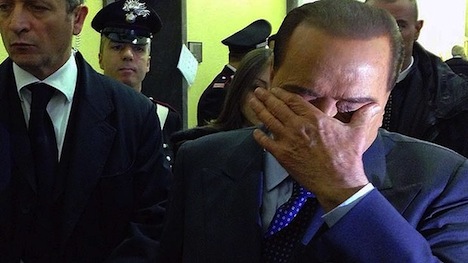There’s not much to say about the decision of Italy’s upper house of parliament, the Senato (Senate), to expel former prime minister Silvio Berlusconi last week.![]()
Berlusconi, convicted on a tax fraud charge related to his media company, faces a year of community service and future legal troubles, most notably over charges of soliciting sex from underage prostitutes.
But the fallout from Berlusconi’s most recent political fall dropped long before his expulsion, as a new generation of Italian political leadership has increasingly taken center-stage in Italian politics.
The first sign was the decision among the center-right ministers in the current ‘grand coalition’ government headed by center-left prime minister Enrico Letta to push back against Berlusconi’s September attempt to bring down the government through a vote of no confidence. Ostensibly, Berlusconi was registering disapproval over the rise of Italy’s VAT from 21% to 22%, but he certainly must have hoped that he could marshal the center-right’s unity to bring down the Letta government, thereby bringing about new elections before the Senate even had a chance to expel him. Despite initially supporting Berlusconi (who has never served as a minister in the Letta government), deputy prime minister Angelino Alfano and the other ministers gradually pulled away from Berlusconi’s position. By the time that the Italian parliament voted, Berlusconi himself had resigned to supporting Letta’s government.
The second sign was the formal rupture in mid-November of the party formerly known as Il Popolo della Libertà (PdL, People of Freedom). When Berlusconi tried to rechristen the party under the name of his initial 1994 party, Forza Italia, Alfano and the other moderates within the party pulled out of Forza Italia to form their own bloc, the Nuovo Centrodestra (New Center-Right). The split meant that Alfano and his allies would continue to support the coalition government and that Berlusconi and his shrinking core of allies would pull their support from the coalition government — it’s a mutually convenient arrangement for both Berlusconi and Alfano, who remain united over their opposition to Berlusconi’s eviction last week and who would still run together under the same broad centrodestra (center-right) umbrella in the event of a new election. Alfano can play the role of a statesman, and Berlusconi, free from the burdens of government (if not free from the demands of criminal liability) will be able to attack Letta and the center-left without abandon.
For his part, Letta will call a new no-confidence vote on December 11 in the wake of the center-right split, asserting control over his government in the post-Berlusconi era, giving Letta a new chance to deliver on the two major issues that his coalition was designed to address — fiscal reforms to make the Italian economy more competitive and election reforms to fix a helter-skelter system that’s partly responsible for the inertia of Italian government.
Compared to those two efforts, the formal vote to kick Berlusconi out of the Senate was a relatively minor affair.
Berlusconi supplanted Alfano, a former minister of justice and Berlusconi’s one-time protégé, to lead the center-right in the election campaign earlier this year. Berlusconi’s shrewd success showcased his residual appeal to Italian voters — Berlusconi powered the centrodestra from a huge deficit to coming within 0.4% of defeating the centrosinistra (center-left) coalition. It’s now a cliché to say that it’s never wise to count Berlusconi out, due not just to Berlusconi’s two decades at the center of Italian politics and power, but also to his wealth and ability to shape opinion through the ownership of much of Italy’s private media.
Polls showed an uptick in Berlusconi’s popularity in the wake of the Senate’s decision, and a December 2 Tecnè poll found that his new Forza Italia still wins about 22% of Italian voters — that’s just around 1% less than Beppe Grillo’s protest Movimento 5 Stelle (M5S, the Five Star Movement) and around 4% less than Italy’s main center-left party, the Partido Democratico (PD, Democratic Party). While Alfano’s New Center-Right wins just 6.9% of the vote, the centrodestra would win around 36% of the vote if an election were held tomorrow to just 31% for the centrosinistra.
‘Aha!,’ say Berlusconi watchers — even at his weakest point, he’s still driving Italian politics.
But it seems more likely today than ever that Berlusconi will never again be Italy’s prime minister. Continue reading Rise of new Italian political leadership eclipses Berlusconi’s expulsion from the Senate
